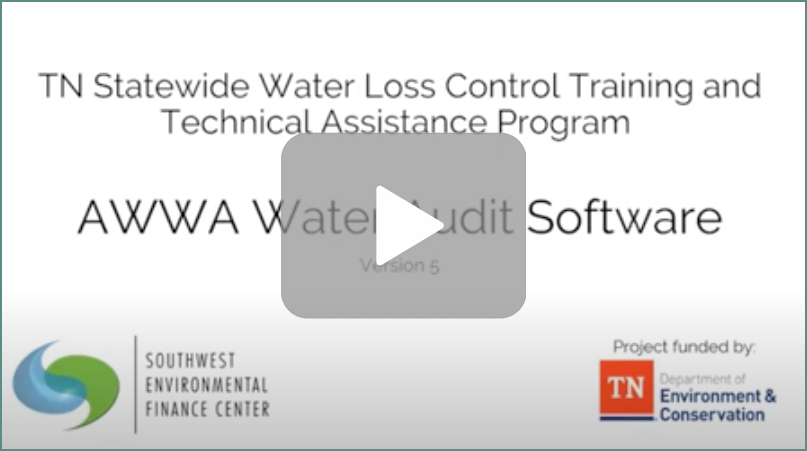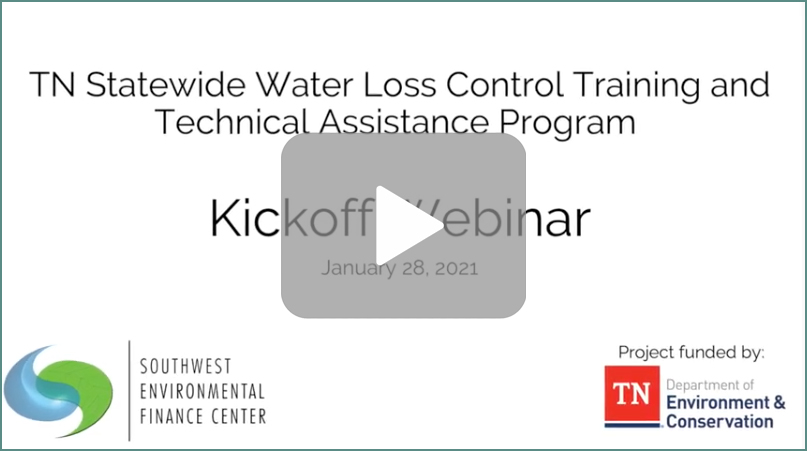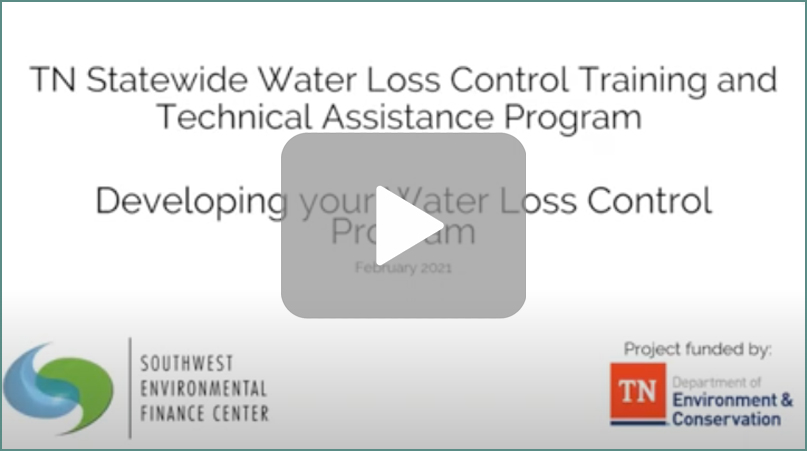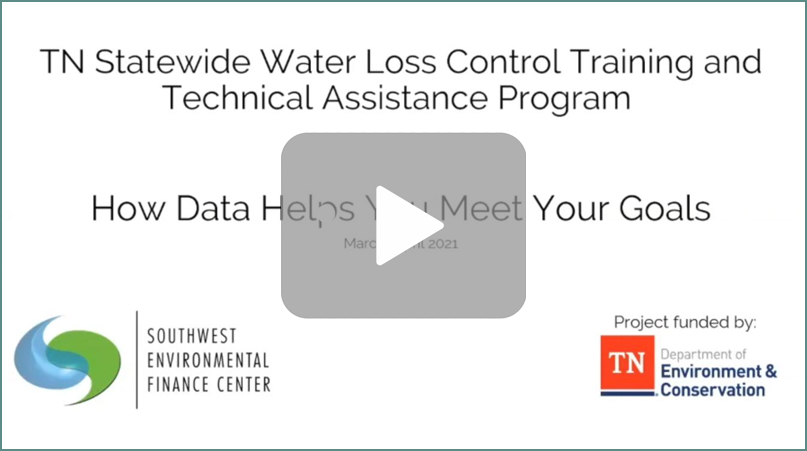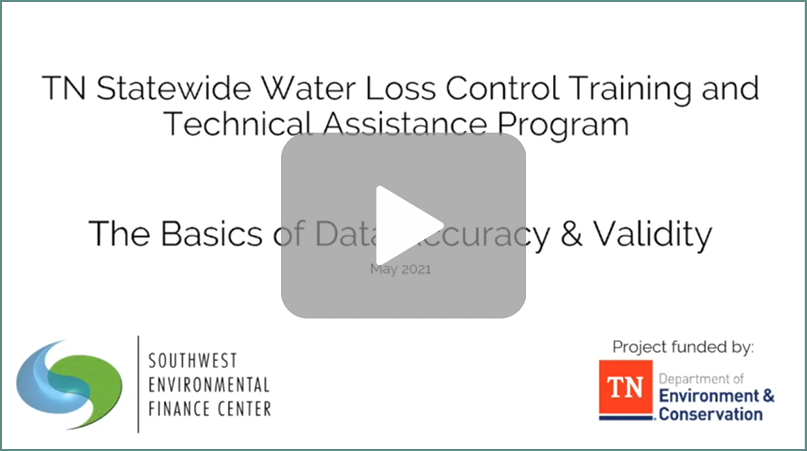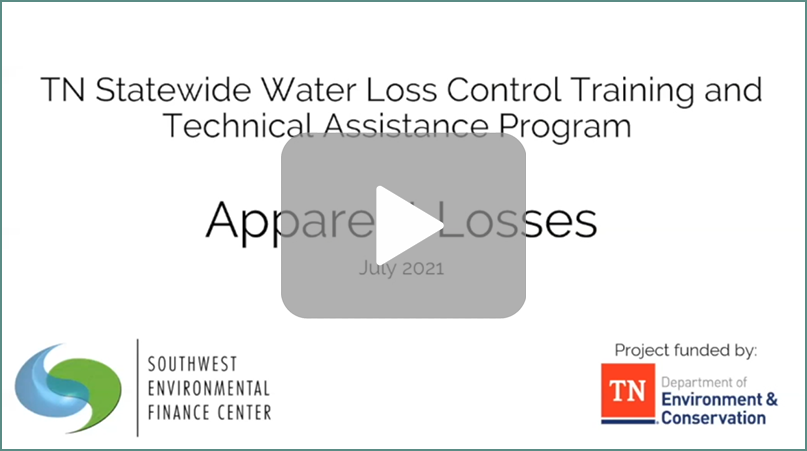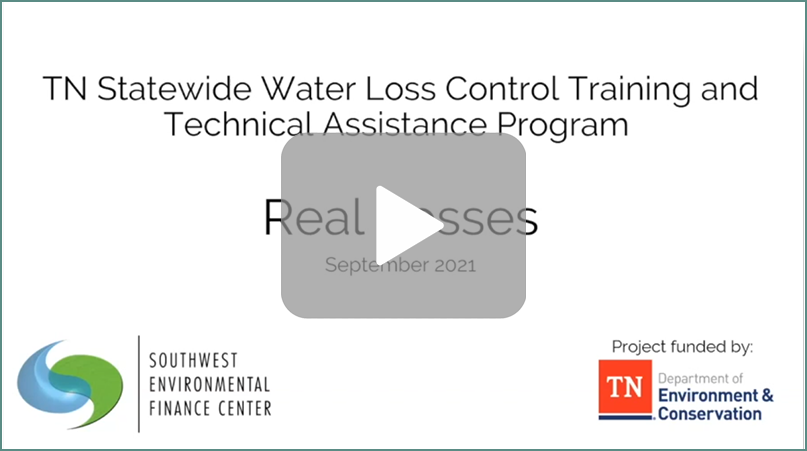Tennessee Water Loss Assistance
Project Brief
This program is designed to teach systems how to develop and implement comprehensive Water Loss Control Programs that assess and combat:
- real water losses (treated water lost from distribution systems through leaks, breaks and overflows) and
- apparent water losses (revenue lost due to faulty metering, billing errors and theft that, on paper, looks like real losses).
The TDEC State Revolving Fund loan program, in partnership with the Southwest Environmental Finance Center, is excited to offer a water loss training series for drinking water utility systems.
Real and apparent water loss affects all water systems. Minimizing these portions of the water balance enables your system to maximize revenues and ensure the integrity of the system. To help your efforts, we are holding a training series to help you identify and reduce water loss. It will also enable you to engage with other systems addressing similar issues.
The training series is designed to help you identify and understand water loss; determine the categories of water usage and loss throughout your system; and assess the quantities of water that are generating revenue and those that are not. The series will also discuss the tools that can be used to reduce non-revenue water and how to select the most appropriate tools to address your individual system’s needs.
The training sessions include:
- Understanding the Water Loss Control Program – its purpose, creating your team, defining your goals
- Using data to develop and meet your goals – water balance data, data needed for measuring goals, component analysis data, benchmarking data
- Analyzing Data Accuracy
- Understanding Data Validity
- Apparent Loss Control Activities
- Real Loss Control Activities
- Tools and Next Steps
These trainings lay out the “big picture” of Water Loss Control from the creation of a team and development of a comprehensive action plan, through implementation of loss control activities, and the tracking of progress over time. They provide practical knowledge that will help systems save water and recover lost revenue.
Webinars
AWWA Water Audit Software
Description: This virtual training was created for the Tennessee Statewide Water Loss Control Training and Technical Assistance Program sponsored by the TNDEC in partnership with the TDEC State Revolving Fund Loan Program.
Presenters: Heather Himmelberger, Dawn Nall, James Markham
Kickoff Webinar
Description: The TDEC State Revolving Fund loan program, in partnership with the Southwest Environmental Finance Center, is excited to offer a water loss training series for drinking water utility systems. Additional information about this training opportunity was provided during the Kick-Off webinar.
Presenters: Heather Himmelberger, Dawn Nall, James Markham
Developing your Water Loss Control Program
Description: How do you know how much of the water you produce is generating revenue and why should you care? Understanding and controlling non-revenue water is important to maximize system revenues, cut energy use and operating costs, improve water quality, address failing infrastructure, and mitigate impacts of limited water resources from drought or contamination.
Presenters: Heather Himmelberger, Dawn Nall, James Markham
How Data Helps You Meet Your Goals
Description: This is the second training in the Water Loss Control Program series. This session focuses on:
- Prioritizing your Water Loss Control Program goals,
- Choosing data to collect based upon your goals,
- And understanding how data can be used throughout the Water Loss Control Program.
The session started with a review of the applied activity you completed from last session – your vision statement and goal setting exercise – and an opportunity to ask questions about the previous lesson. After that, the session included a goal prioritization activity and focus on the need for and use of data to help you develop your water balance, measure your goals, benchmark your results, and conduct component analysis.
Presenters: Heather Himmelberger, Dawn Nall
The Basics of Data Accuracy and Validity
Description: When you develop a Water Loss Control Program you must base decisions on the data you have available. Understanding the accuracy and validity of the data will help you decide whether the investments in actions are reasonable or whether additional data quality or validity should be undertaken before making the investment. This training covers:
- How to assess the accuracy and validity of the data you are using
- How to evaluate the quality of the data to make sound decisions going forward
- Steps to take to improve data quality
Presenters: Heather Himmelberger, Dawn Nall, James Markham
Apparent Losses
Description: To date, the Water Loss Control Program Training series has covered Water Loss Control Programs, Goal Setting and Data, Audit Data Accuracy and Validity. The series now moves into Water Loss Control Activities.
This training session will focus on Apparent Losses and how your water system can better understand, control and reduce them. During this session you will learn the answers to the following questions:
- What is apparent loss, and how does it differ from real loss?
- How do I find the volume, value and validity of the apparent losses in the water audit?
- What factors would drive me to take action to reduce apparent losses?
- How do I identify what contributes to apparent loss? The session will also include a real-world example of the impacts of apparent losses for one utility.
Presenters: Heather Himmelberger, Dawn Nall, James Markham
Real Loss
Description: This training session will focus on Real Losses including leaks in your system. The training will emphasize how your water system can better understand, control and reduce real loss and leaks. During this session you will learn the answers to the following questions:
- What is real loss, and what does the water audit tell you about real loss?
- How do I find the volume, value and validity of the real losses?
- What are the sources and types of real loss?
- What practical tools can utilities use to address real loss?
The session will also include a real-world example of the impacts of real losses for utilities.
Presenters: Dawn Nall, James Markham

